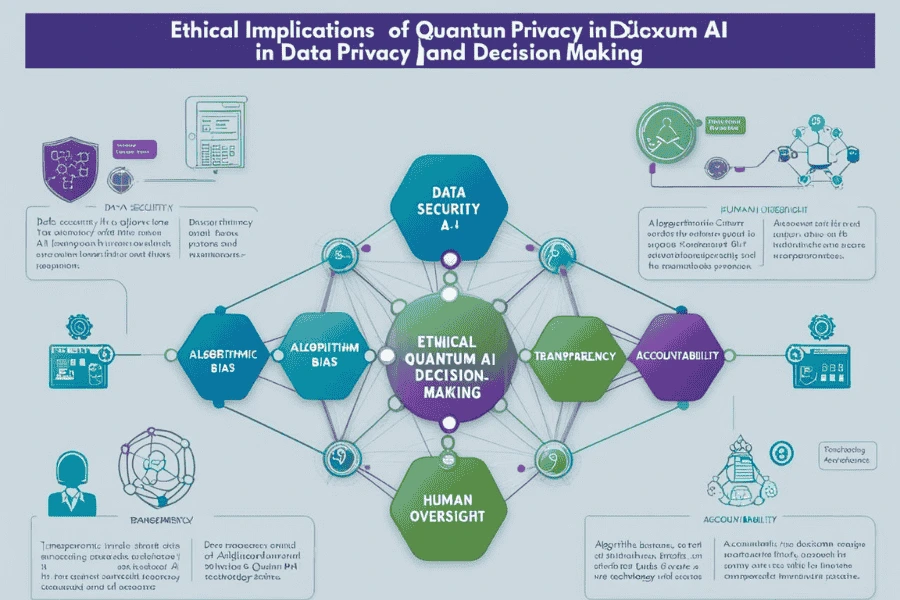Ethical Implications of Quantum AI in Data Privacy and Decision-Making
Introduction
The power of quantum computing lies in its ability to solve problems at an exponentially faster rate than traditional computers. By enabling quantum AI systems to analyze vast amounts of data with unprecedented speed, we open doors to major advancements. However, this computing prowess introduces serious risks, especially in the realm of data privacy.Today, most data security relies on encryption algorithms like RSA and Elliptic Curve Cryptography (ECC), which could be easily broken by a sufficiently powerful quantum computer. If quantum AI becomes capable of decrypting current encryption standards, it could render sensitive data ranging from personal information to trade secrets vulnerable. As a result, there is a pressing need for the development of quantum-resistant encryption, which could safeguard information against quantum-powered attacks.

Building Ethical Governance for Quantum AI
To ensure the ethical use of quantum AI, robust frameworks for governance and regulation must be put in place. This includes addressing quantum AI security concerns and ensuring these technologies do not violate privacy or lead to misuse.Quantum cryptography, which uses the principles of quantum mechanics to secure communications, could be key to solving privacy issues. However, the ethical application of quantum cryptography will need to be carefully considered to prevent overreach, such as enabling mass surveillance.
Governments and regulatory bodies must also collaborate to create standards and guidelines that ensure quantum AI is used iTo ensure the ethical use of quantum AI, robust frameworks for governance and n ways that respect human rights. As we continue to develop these technologies, the question of how to regulate them, particularly concerning privacy, will become increasingly pressing.
Addressing the Ethical Risks: How Can We Mitigate the Impact?
While the ethical risks associated with quantum AI are significant, there are several proactive steps that can help mitigate potential harm. One critical area is post-quantum cryptography, where researchers are developing quantum-resistant encryption techniques to safeguard data in the quantum era. It’s vital that both governments and technology companies prioritize these initiatives to prevent a future data security crisis. Another key concern is bias in AI. System developers must embed fairness and transparency into algorithms from the ground up to prevent the amplification of existing biases, especially as quantum capabilities enhance AI performance. Additionally, establishing clear accountability structures is essential to ensure that responsibility for decisions made by quantum AI systems is well-defined and enforceable. Lastly, due to the global impact of quantum technologies, international cooperation is necessary to create and uphold universal ethical standards that ensure responsible and equitable development of quantum AI worldwide.
Uses and Applications of Quantum AI: Ethical Implications in Focus
Quantum AI can significantly accelerate drug discovery, enhance treatment planning, and analyze complex medical data in real time. Yet, the use of sensitive patient data raises privacy concerns, particularly if quantum algorithms are capable of breaching traditional encryption standards. In finance, the technology is applied to fraud detection, risk assessment, and high-frequency trading. While efficient, these applications rely on automated decision-making systems that must be transparent and fair to avoid perpetuating algorithmic bias or unethical financial conduct. In the realm of cybersecurity, Quantum AI offers both enhanced threat detection and encryption capabilities, but its ability to break current cryptographic systems presents a dual-use dilemma, posing risks to personal and national security. Governments and defense agencies may harness Quantum AI for intelligence analysis, surveillance, and predictive operations, which necessitates strict accountability and international regulation to prevent misuse or erosion of civil liberties. In legal systems, Quantum AI could aid in case prediction, legal research, and modeling judicial outcomes, but entrusting machines with such responsibilities challenges foundational principles of due process, fairness, and legal accountability. As Quantum AI becomes increasingly embedded in critical infrastructures,
Simulation and Modeling: Quantum computers could improve simulations of complex systems and processes, such as weather forecasting, molecular dynamics, and financial modelling, by enabling more accurate and detailed simulations.
Artificial Intelligence and Machine Learning
Quantum machine learning is another area seeing rapid growth. Researchers use low-rank matrix approximation algorithms, inspired by quantum linear algebra, to train deep learning models more efficiently. By understanding the trade-offs in quantum vs classical computing performance, teams can make smarter technology investments. For those starting out, exploring the best quantum computing courses can build a strong foundation.
Conclusion
As quantum AI continues to develop, it has the potential to dramatically transform many aspects of our lives particularly in terms of data privacy and decision-making. However, these advancements also present significant ethical challenges that cannot be ignored. To navigate the future responsibly, we must prioritize ethical principles like transparency, accountability, and fairness in the design and deployment of quantum AI technologies.The future of quantum computing and AI must be built on a foundation of strong ethical governance, ensuring that these powerful tools enhance human life without compromising our rights or freedoms.
Active Events
Best Tips to Create a Job-Ready Data Science Portfolio
Date: Aug 06, 2025 | 7:00 PM(IST)
7:00 PM(IST) - 8:10 PM(IST)
2811 people have registered
3 Must Have Projects On your CV to Get into Data Analysis
Date: Aug 05, 2025 | 7:00 PM(IST)
7:00 PM(IST) - 8:10 PM(IST)
2753 people have registered
Bootcamps
Data Science Bootcamp
- Duration:8 weeks
- Start Date:October 5, 2024
Full Stack Software Development Bootcamp
- Duration:8 weeks
- Start Date:October 5, 2024
